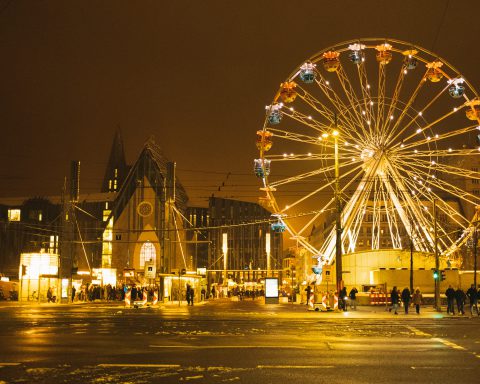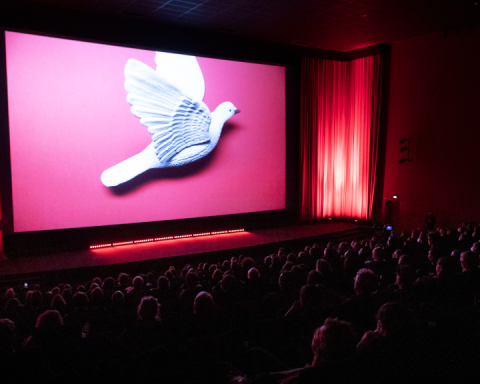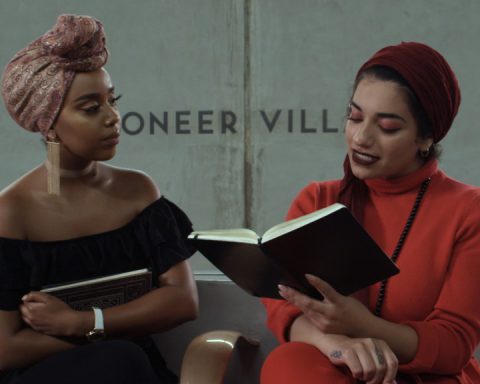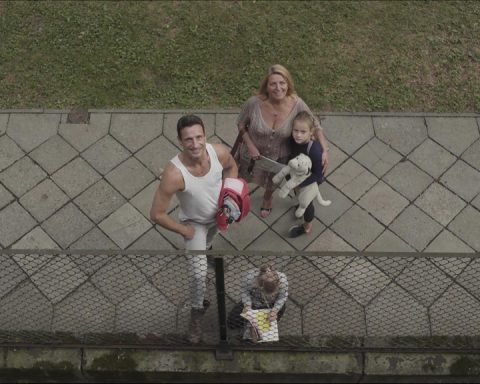I am an escapist. Not the Houdini kind. Some escape into music. I generally escape into the moving image. When I’m stressed, I just find some predictable teen angst flicks to watch. You know the kind. The awkward girl/guy likes the cool guy/girl and the geeky guy/girl likes her/him and you know that is really the one you’d want now, but then you wanted the other one, but you had to watch the film to find out.
My other escape genre is documentary. Recently I attended my first DOK festival and, as you can imagine, I was in escape heaven/hell. Heaven because there were so many great ones to see. Hell because there were so many great ones to see. Next year I’m blocking out the whole week!
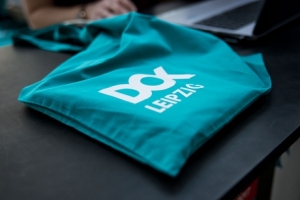
Opening Ceremony at Cinestar
The first thing I noticed was how calm and organised everyone who worked for DOK was. Anytime I asked for something from the press office, they responded quickly. When I met them at the opening, they knew who I was. I’m not such a star. There was loads of press there, so I was very impressed.
The opening was moderated by film critic Knut Elstermann. I was one of 700 who heard how important this festival is to Leipzig and Germany.
German Minister of Culture and Media Prof Monika Grütters highlighted the importance of documentary film.
“In the digital age of information overload, we need documentaries and their extensive research. They are able to make relevant themes visible and make reality in all its complexity understandable. A democratic culture of debate basically lives from the willingness to examine reality.”
There was a strong female presence on stage. Saxon State Minister for Science and the Arts Dr Eva-Maria Strange said, “The festival frequently responds to socio-political questions with its program. A good example of this is the DOK’s prize for female filmmakers. I am very glad to once again take over the patronage of this prize.”
This is the second time this prize is being awarded as part of DOK Co Pro-Market in conjunction with the European Women’s Audivisual Network (EWA).
Festival director Leena Pasanen took the stage with an air of command and grace. Since she has become the director, she has been a strong advocate for equal opportunities. She remarked that women directors had been consistantly well represented in the International Competition, “but we’ve noticed significant fluctuations in the German Competition over the last few years.” Sighting that there is a problem in the industry, she announced that for the next two years there will be a quota for female directors in the German Competition.
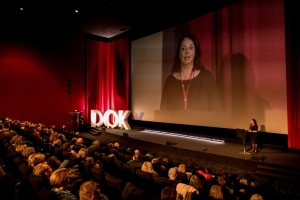
She said she knew some would disagree. I have to say I am one of them. Like the artists who recently denounced the Preis der Nationalgalerie, my instincts tell me that we should all be rewarded according to the quality of our output and not our gender, but I guess we have to start somewhere to change the system. The fact that it is for two years speaks to the fact that she hopes it’s a temporary solution.
The festival has been examining hot topics since its founding in 1955.
Pasanen said, “We have no more physical walls in our immediate surroundings, but the idealogical walls of many are increasingly noticeable.”
DOK im Knast
One of the walls the DOK festival is breaking down is money. There were several showings in town for free. Another was more unexpected. There were three showings at Regis-Breitingen Juvenile Prison. I was happy that the first fit into my schedule.
Wild Heart (Wildes Herz)
Charly Hübner, Sebastian Schultz, Germany 2017, 90 min.
The films were chosen by a jury of detainees. I was lucky to be there on the first evening when they awarded a prize to Wildes Herz, a film about a guy from the rural area of Mecklenburg-Vorpommern who could have easily fallen into the wrong crowd. By a twist of fate, namely singing at his sister’s wedding, he is now the lead singer for one of Germany’s most successful punk bands, Feine Sahne Fischfilet.
This is one of those random happenings that has turned into something of great proportions. Popular German actor Charly Hübner was shooting on location and met lead singer Jan “Monchi” Gorkow in the street. He really identified with what he was doing and decided to do a documentary on him.
The story is much more complex than country boy sells records. This year is the 25th anniversary of the Sonnenblumen-Haus fire in Rostock Lichtenhagen. I say “fire”. This was much more sinister.
The Sonnenblumen-Haus was a dormitory filled with Vietnamese contract workers and the central reception centre for refugees. On 22 August 1992 at least 2,000 people, including some right wing extremists, began to besiege the building. This continued and took on power as more right wing extremists from all over Germany traveled to join them. Over the next four days, the active numbers would fluctuate, but the violence would escalate, usually cheered on by 3,000 onlookers.

“Germany for Germans” and “Foreigners out!” Mob mentality took over and the rocks and stones they had been throwing had graduated to Molotov cocktails. While the refugees had been evacuated the day before, the building was still occupied by 115 Vietnamese (workers and their families), a ZDF television crew and Rostock Foreigners Commissioner Wolfgang Richter.
Overwhelmed, the police retreated and left those in the building to fend for themselves. Later in the evening reinforcements from the capital, Schwerin, arrived. This did nothing to deter rioters. Another flat was set on fire and around 1,100 people continued to riot into the next day, their rage now directed at the police.
Once the situation was finally under control, the refugees were safely removed. Luckily no one died, but it was blatantly clear that racism was very very much alive. Monchi says when you come from a place with that kind of history, you have to make sure it doesn’t happen again.
When I asked one of the jury at the prison why they had given the award to this film, he said it was everything about it. It was very different from the others in the way it was shot. Because the film showed how Feine Sahne Fischfilet regularly plays at Antifa demonstrations, I asked if there was a problem with Nazis in the prison. He said there may be 4 there. He said no one at this prison was there for more than two years and there was not enough time for them to really organise. I think he viewed racism as something more common with the older generation because he also gave the reasoning as being that no one was over 27.
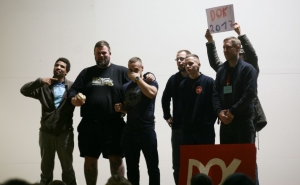
DOK works within the realm of art therapy in the prison. Monchi was given something invaluable, a piece of art one of them had made. There were so many good vibes all around. Like I said, I was glad I had gone that evening.
The film went on to win 4 Golden Doves at the DOK award ceremony.
First and Foremost (In erster Linie)
directed and animated by Veronika Schubert, Austria, 2016, 5:30 min
Charly Hübner had his accidental meeting and I had a couple of my own. DOK was not only a documentary festival, but it also included animation. While on the way to the prison I met an Austrian artist named Veronika Schubert whose medium is animation. To be honest, I was pleasantly surprised to see this kind of work at DOK. It shows their ability to access quality from a variety of perspectives.
In each project Veronika develops a new technique. For the piece for DOK, she hand engraved glass slides. The topic of the piece was the noncommittal statements made by politicians, either from their own mouths or from newscasters.
“We have to get to the root of the problem.” “However, there are no specifications. ” “Almost all heads of state call the situation urgent.” As we listen, we see clouds roll by.
Veronika finds herself at many film festivals, as her work is quite popular. And, if you’ve wondered how to buy a video work, she sells a hard drive with the piece and 2 boxes of glass slides for 3400€. It’s a limited edition of 5.
Another such encounter happened as Ana told you earlier. We met Joe Boots at the opening ceremony buffet. Once I knew he was a vet, our attention soon turned to the hot topic of the week. If you remember, pre-Weinstein was Colin Kaepernick and taking a knee. Joe Boots spoke right up and said he had fought for Kaepernick’s right to protest. He saw no disrespect to the sacrifice those who serve make for their country.
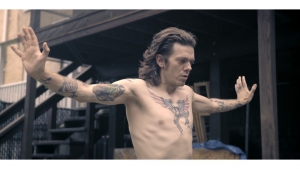
I hope the documentary can do what he and the film’s director, Florian, want it to. It’s not meant to be anti United States in any way. It is to bring awareness to the plight of those who return with PTSD and other injuries. Like Joe said, “Maybe think about the fact that you can’t take care of your soldiers who return before you think about sending more into battle.”
If you get a chance to see this, do it. It is artistically shot with great understanding. The deer in the cemetery! OMG! And no, they did not put them there. Some things just come to you when you need them. I’m glad Joe approached me. I think I got something I needed from meeting him.
Jay Rosenblatt (Die NaTo)
I wasn’t the only one there from Leipglo who was a DOK virgin. Marco, the guy who did our video, was there too. Luckily we saw different things. Now that we’ve had a little time to rest, we got to sit down and have a chat about it. I must admit I was a bit jealous that he had seen Jay Rosenblatt’s work and I hadn’t.

At the beginning of each showing was a little vintage clip of a dog in slow motion “shaking it off.” I had already asked who did it because I loved it.
Marco said Die Nato was the perfect place to watch this homage to Rosenblatt’s work. Rosenblatt works with archival footage, original images, voice over and classic pieces to create new stories. What a gem!
I actually was at a Skype interview/talk that he did at GfZK a couple of years ago. I remember how excited he was when he talked about canisters of long forgotten reels. And then the process of going through them to see what had survived. A lot came from old schools who were updating.
When you take from existing material, you have to put things in new contexts. In a Variety interview he said, “Found footage also has this collective unconscious aspect to it, so there is a familiarity for the audience.” They asked if he saw himself as a documentarian. He replied, “Yes as a documentarian but also essayist, collage artist, experimental filmmaker, provocateur, entertainer and, not to sound presumptuous, at times a healer.”
DOK proved to be a vehicle for discourse. Any wounds it opened, it opened in order to heal. I’m already excited about the next edition.


